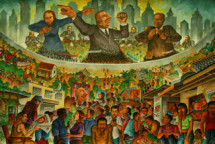Farm dwellers in Kwa-Zulu Natal South Africa and the politics of home
Temas
Regiones
What does radical economic transformation mean, and in particular, what does it mean for farm dwellers in South Africa?

Autores
The term has been used by the ruling party, the African National Congress to regain popular support in the face of calls by an opposition party, the Economic Freedom Fighters (EFF) to expropriate land without compensation and to transfer the wealth of the country from white capital to black capital. In this paper we draw on data from a survey and anecdotes to explain that farm dwellers are resisting the notion of private property and asserting their own meaning of home and belonging to the land. The conditions revealed by the data show that farm dwellers suffer employment precariousness together with persistent tenure insecurity. This combination of conditions explains why some farm dwellers leave farms for homes elsewhere or in search of better prospects. However, a significant number of households remain on farms despite difficult and worsening living conditions, which contradicts the processes of “rural hollowing” (Liu et al, 2010) that a simple analysis of push-pull migratory trends suggest. We thus propose that farm dwellers are asserting a politics of home, of belonging to the land. Unable to secure regular or ‘decent’ employment in the ‘new’ South Africa, some farm dwellers hang on to ‘home’ as a silent expression of a ‘subaltern politics’ (Spivak, 1998).
This politics arises from national and global drivers of agrarian change, in so far as the structure of commercial agriculture erodes local wage employment as a result of the squeeze on profitability at farm level (in the context of the vertical integration taking place in global agrarian capital), but it also stands in tension to them. Farms are spaces of white control, with the social power of the farmer vested in his historically unlimited ownership of land and control over every aspect of the lives of the people on his farm (‘his’ used intentionally). The politics of home challenges this control and the property relations that underpin it. It thus suggests a possible emancipatory politics in its challenge of hegemonic relations at farm level, but also contradicts the elitism that seems actually to be at the centre of the populist calls being expressed by political leaders. Our interest is holding dialogues and debates with farm dwellers on what their views are on land and agrarian reform i.e. who should get the land, for what purposes and under what terms. The plan is to develop a curriculum for political education that is aimed at assisting farm dwellers respond to these three questions.
This paper was presented at the Emancipatory Rural Politics Initiative (ERPI) 2018 Conference: "Authoritarian Populism and the Rural World"